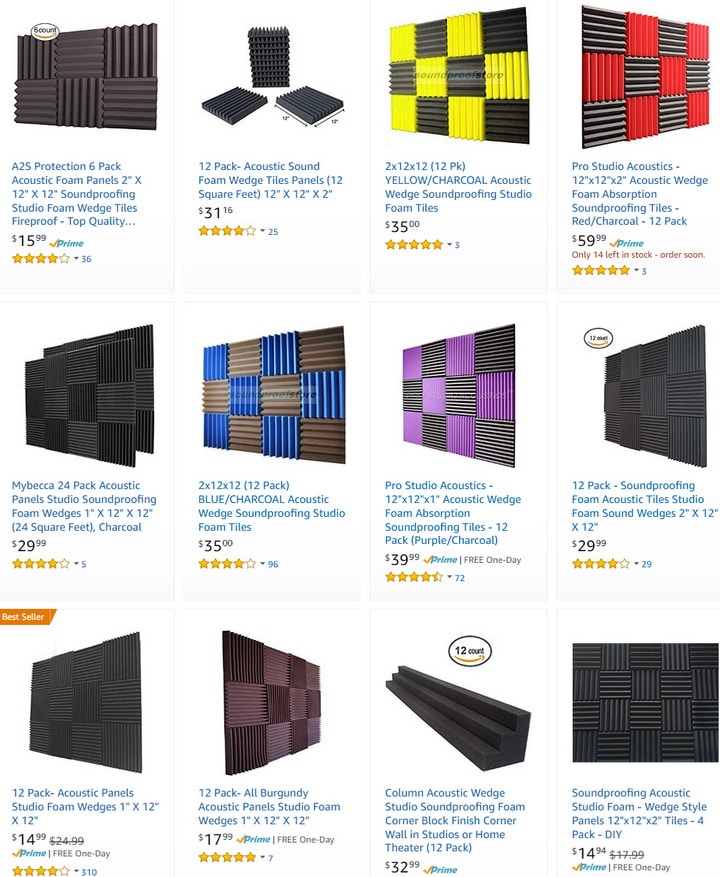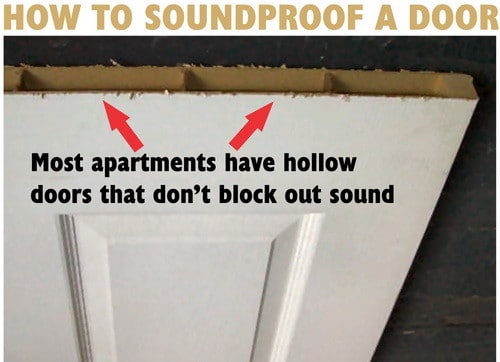Living in an apartment with loud roommates? The apartment you live in is small and all noises come straight into your bedroom. Is there an easy way to lessen the noise and soundproof my door and room myself? Yes there are many things you can do when it comes to soundproofing to get your bedroom door (that is most likely hollow) to absorb and block the loud sounds. If noise cannot be stopped from the source, you need to block and or absorb it. Living in an apartment makes it so you are unable to replace things like doors. We are going to show you a few ways to successfully soundproof a room that has a cheap hollow door.
The first thing we recommend is trying to dampen the sound near the source. If the living room, dining room or kitchen has tile or wood floors, the sound has no way of being absorbed. The easiest thing to do in this situation is buy some cheap rugs for the kitchen or one big rug for the living or dining room. This will help absorb the sound before it can enter your bedroom.
A sheet of thick sound absorbing foam or 3/4 inch medium density sound deadening fiberboard cut to the size of your door can make a big improvement. You can install this yourself without leaving a big mess to repair when you move out of your apartment. All you will need to attach the sheet of foam or fiberboard to your bedroom door is 4 wood screws. If you install the foam on your door, put washers around the heads of the screws. The washers are needed so the screw heads stay on top of the piece of foam.
You can also install removable door gaskets to cover any parts of the door where sound may be entering. These install on the perimeter of the door frame blocking any sound that may enter. They can easily be removed when needed or moving out of your apartment.
A heavy set of acoustic drapes can also help if installed over or to the left and right of your door. At night when you are in bed and ready to sleep, you can slide the drape in front or on the sides of your door to help block and absorb the sound waves.
Some other ideas to deaden sound in your bedroom…
Place bookshelves on either side of the door to help absorb the sound can really help.
Move your bed to the opposite wall away from where the sound is coming from.
Get a large rug for your bedroom or a runner if the floor is wood or tile.
A white noise machine can help by producing a constant sound that will cover up any other intruding noises.
Buy a set of earplugs and put them in before you go to bed.
A small fan running on low setting near your bed can help mask sounds.
 Soundproofing materials for rooms and doors
Soundproofing materials for rooms and doors
Need some tips on soundproofing your room or door? Let us know below and we will be happy to help!




I am currently building a music studio in a walkout basement. I have thin paneling on the walls. I hung 3×5′ Military Service flags on the walls and hid 2.5′ x 4.5′ sections of 2″ eggcrate foam behind each flag. Then placed rigid foam in the window sills and thick drapes over that. This greatly improved my acoustics in there.
Let’s say I buy that sound board from Home Depot.
Do you recommend I put it on the outside of my door, or on in the inside?
I mean inside my room or outside my room?
My door just not seem to be hollow. But the home I live in has all wood floors through out the floor I live on. The noise carryall quite a bit. What would be the best idea to dampen sound. Is there something I can put under the door.
My doors are 82″ x 80″ x 1 7/8″ Great Stuff is exactly what the name implies, but it is not inexpensive. Are there any other product you would recommend?
Great!! Doing this tomorrow. Thank you!!
Miko,
The acoustic panels can be cut and applied to your college room door. A hollow door needs something to block the sound and acoustic panels will work. You can try a vinyl sheeting too. You buy it in sheets, cut to size and apply to your door. Here are a few links to some good soundproofing for your college dorm door.
Mass Loaded Vinyl 4′ X 10′ 40 Square Feet 1 Lb MLV Acoustic Barrier
OR
Acoustic Wedge Studio Soundproofing Foam Wall Tiles
-RR
I’m struggling to find the right size of soundproof foam panel for my wooden door! I’m in a college dorm and my door is old hollow wood and lets sound in rather easily. The door is 12 width by 84 height inches. Any advice on how to install the panels, and what size of soundproof foam panel should I use?? An amazon link would be nice.
Fiona,
Soundproof the door with an acoustic foam padding. It is available in many home improvement stores and online. Is you townhouse door hollow? Is it the front door or a bedroom door? Give more details and we can assist further with soundproofing. The carpet helps to muffle noise but if you hear noises from the floor as in noisy neighbors, consider large rugs to cover certain areas to further muffle and soundproof the noise from the floor.
-RR
I’m trying to soundproof my room on the second floor with a window in a townhouse. I figured out a way to soundproof the window but i’m lost on how to soundproof the door. Also, my flooring is carpet. Any advice?
Margareta,
Are you in a home, apartment, second floor? There are different floor soundproofing methods for different configurations.
-RR
There are many products available on the market like acoustic panels, ceilings, wall absorbers, and more but I don’t know which one is perfect for soundproofing. Can you guide me how to do floor soundproofing?? Thanks in advance. I have searched some data on it but need more help.
I soundproofed my bedroom door in the following manner.
My bedroom door was hollow. I drilled some 1/4 inch holes in the top of the door. Then I took some “Great Stuff Door Insulation” and sprayed it into the holes I drilled into the top. The stuff fell to the bottom and began to expand. I waited a few minutes to give the stuff time to fully expand. Then I sprayed some more into the holes and again waited to allow for foam expansion. This continued until the foam came out of the holes indicating the door was full of foam. The excess foam oozed out of the holes in the top of the door. Be sure to drill more than just one hole to allow the air to escape at a faster rate than the foam is expanding. And the holes are on the top of the door so they cannot be seen. The weight of the foam was not enough to affect the weight placed on the hinges. The door was still aligned with the latch bolt going into the cavity properly.
It sure did cut down on the noise.
A lot of the suggestions here and in the videos are more related to acoustics than actual sound isolation. Acoustics will improve the quality of sound in a room and is done so with insulation board, foam, rugs, drapes, etc. Sound isolation takes much more than that and is usually accomplished with decoupling, damping, mass, and absorption in the walls instead of on the walls (acoustics).